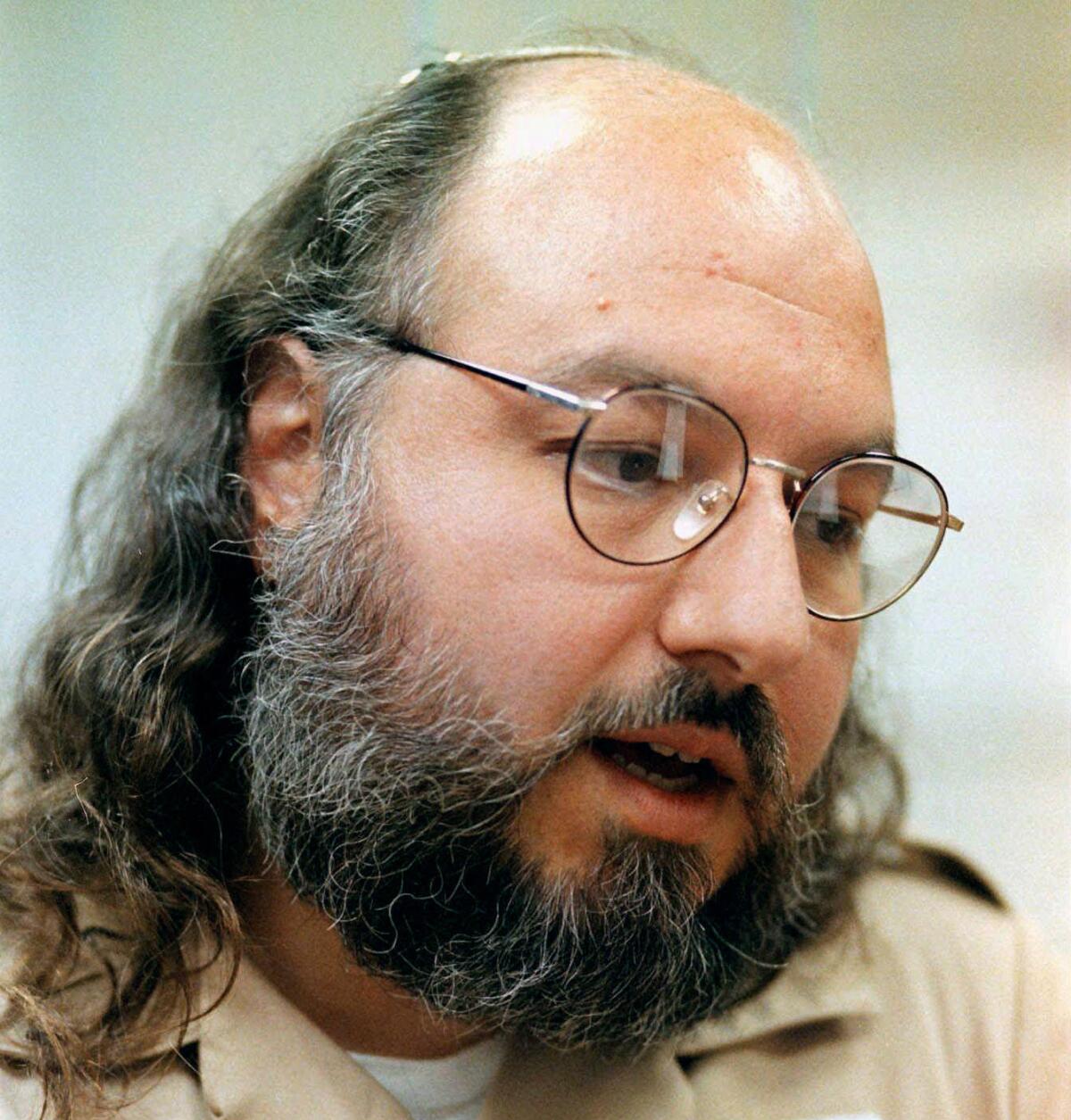Jonathan Pollard, American who spied for Israel, to get parole

Jonathan Pollard gives an interview at the Federal Correction Institution in Butner, N.C., on May 15, 1998.
- Share via
Reporting from Washington — Former U.S. intelligence analyst Jonathan Pollard, whose spying for Israel created a serious breach in relations between the two allies, will be paroled in November after serving 30 years of a life sentence, the Justice Department said Tuesday.
The release will remove a long-standing irritant in U.S.-Israeli relations. In Israel, Pollard is widely regarded as a hero whose sentence was unduly harsh. In the United States, numerous defense and intelligence officials still bristle over Pollard’s crimes, and have fought Israel’s attempts over the years to win clemency for him.
The release, set for Nov. 21, comes at a time of renewed tension between the Israeli government and Obama administration over an international agreement to restrict Iran’s nuclear program. But U.S. Secretary of State John F. Kerry and other American officials emphasized that foreign policy considerations were not a factor in Pollard’s release. Israeli officials have likewise said the release will not soften their opposition to the Iran agreement, which they say is not strong enough.
A parole board unanimously decided to release Pollard after a hearing July 7, according to a statement by Pollard’s attorneys, Eliot Lauer and Jacques Semmelman. “We are grateful and delighted that our client will soon be released,” the statement read.
The Justice Department said it did not oppose Pollard’s release, describing it as a “mandatory parole.” Under the law in place at the time of his sentence, Pollard would become eligible for parole after serving 30 years. Parole would be granted as long as Pollard had not violated prison rules and was not considered likely to commit another crime.
“The Department of Justice has always maintained that Jonathan Pollard should serve his full sentence for the serious crimes he committed, which in this case is a 30-year sentence,” said Marc Raimondi, spokesman for the Justice Department’s national security division.
Pollard, 60, a civilian naval intelligence analyst, was arrested in 1985, pleaded guilty and was sentenced in 1987 for selling Israel what prosecutors said were massive amounts of technical information about U.S. spy satellites and other collection systems, including photographs, maps and classified manuals.
“It was a gigantic amount of information, and stuff of the highest top-secret code word classification,” Joseph diGenova, the Washington lawyer who prosecuted Pollard, said in an interview Tuesday.
DiGenova said that U.S. intelligence authorities suspect that some of the material obtained from Pollard was bartered to the Soviet Union in return for the release of Soviet Jews to Israel, and that U.S. intelligence “assets” in the Soviet Union were compromised and possibly killed as a result.
Several U.S. officials have opposed efforts to release or pardon Pollard over the years, including former Vice President Dick Cheney, former Defense Secretary Donald Rumsfeld and former CIA chief George Tenet.
DiGenova said the Justice Department should have opposed Pollard’s release “as a deterrent to other government employees who would ever contemplate selling national security information to a foreign power, friend or foe.”
Pollard insisted that his motivation was to help Israel, an ally of the U.S., and that the U.S. was withholding from Israel critical intelligence on Palestinian terrorist training camps. Prosecutors noted that Pollard demanded money from Israel from the beginning, was paid $50,000 and stood to get much more if his activities had continued.
In addition to causing a rift between the two countries, Pollard’s arrest provoked a schism between Israel and the American Jewish community, with U.S. Jews complaining that the operation had called their loyalty into question.
Israel initially denied any part in Pollard’s spying, turning him away at the gates of the Israeli Embassy in Washington when he sought refuge there shortly before his arrest. They later insisted that Pollard was part of a “rogue operation” not sanctioned by the government. Only later did the government formally acknowledge that the operation was run by a Ministry of Defense intelligence chief working in Prime Minister Shimon Peres’ office in Jerusalem.
After initially shunning Pollard, subsequent Israel governments embraced him as a patriot, granting him Israeli citizenship.
“After decades of effort, Jonathan Pollard will finally be released,” Israeli Prime Minister Benjamin Netanyahu said in a statement Tuesday. “Throughout his time in prison, I consistently raised the issue of his release in my meetings and conversations with the leadership of successive U.S. administrations. We are looking forward to his release.”
Upon release, Pollard is expected to live in New York, where his lawyers said they have arranged a job for him. The initial statement from his lawyers said the parole commission had required Pollard to remain in the U.S. for at least five years. Lauer later said in an interview that the exact conditions of Pollard’s release are not yet known.
Lauer and Semmelman called on President Obama to use his clemency powers to release Pollard immediately and allow him to move to Israel, where his wife, Esther, lives.
According to Pollard’s lawyers, Pollard had been denied parole in July 2014. They said they were informed this month that the Justice Department would not oppose his release.
Special correspondent Batsheva Sobelman in Jerusalem contributed to this report.
ALSO:
Rights groups criticize Obama for calling Ethiopia’s election ‘democratic’
Libyans shrug as Kadafi’s son gets death sentence
NATO pledges ‘strong solidarity’ in Turkey’s fight against terrorism
More to Read
Sign up for Essential California
The most important California stories and recommendations in your inbox every morning.
You may occasionally receive promotional content from the Los Angeles Times.














